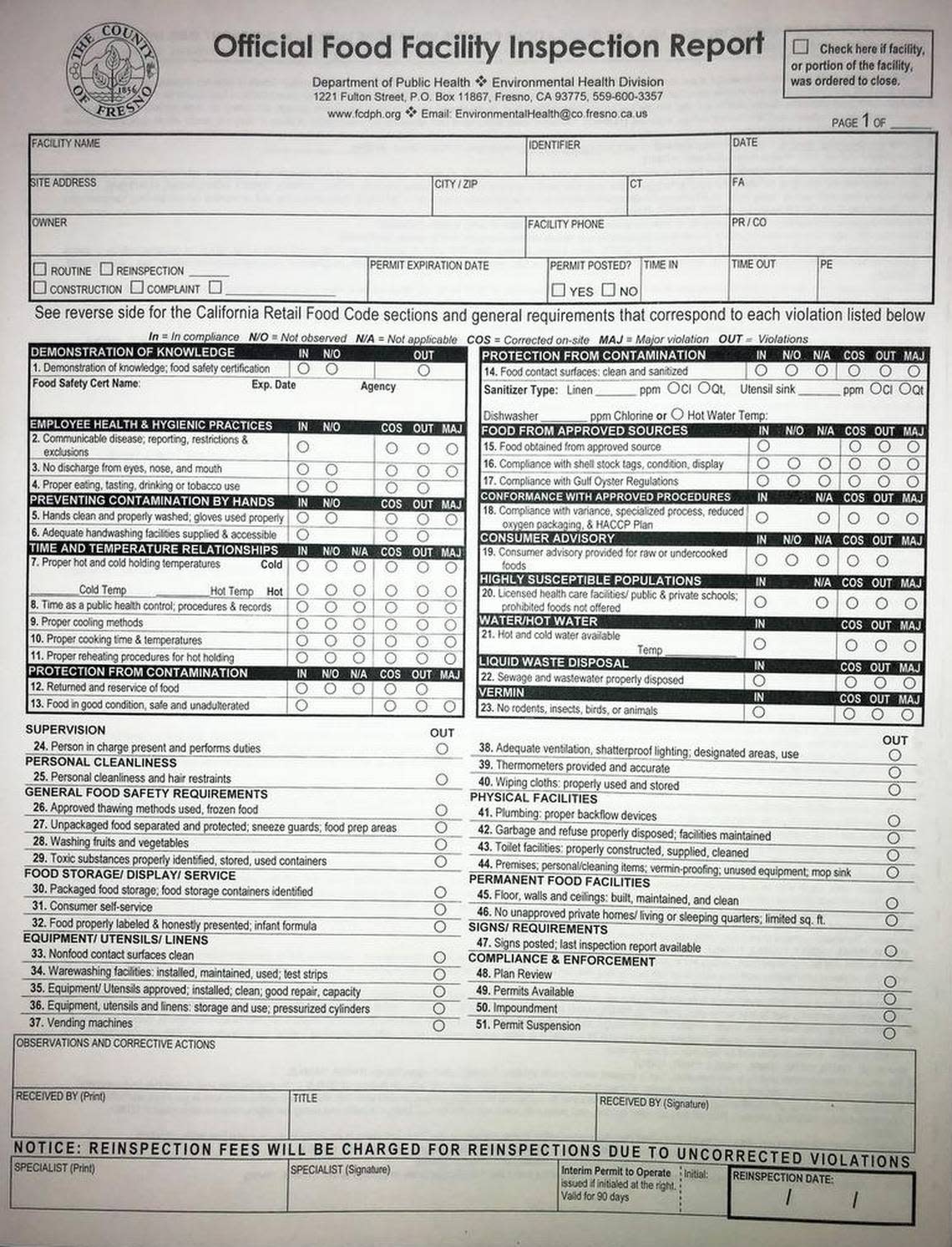Health inspections close some Fresno County restaurants in December. Here’s what was found
A northwest Fresno coffee shop operating without a permit and lacking plans for unapproved changes to the restaurant has been closed since early December, following an inspection by the Fresno County Department of Public Health.
And a leaky ceiling shut down a bar at a ski resort near Huntington Lake for about nine days.
A Dec. 4 visit by a health inspector to Saint Coffee, in the Pavilion West shopping center at Bullard and West avenues, determined that the coffee shop was operating without a valid permit from the county’s Division of Environmental Health. The inspection also showed that several changes to the location of equipment had been made without submitting required plans to the health department, including the installation of an unapproved matcha bar.
The result of the inspection was a closure order until the owners secured a permit and submitted plans for the changes made to the kitchen area and correcting other violations. The health department reported that the business remained closed as of Tuesday.
In the mountains of eastern Fresno County, the Mainstream Bar at the China Peak mountain resort at Huntington Lake was closed following a Dec. 18 inspection visit that revealed a “moderate” water leak from the ceiling directly above the bar. The closure order issued by an inspector required repairs to the roof “as soon as possible to prevent the contamination of food and drinks.
The bar was among several food service facilities at the ski resort that were inspected on Dec. 18 and 19.
Among other violations noted at the bar were a lack of dispensers for soap and paper towels at the handwash sink; rodent feces in some of the drawers at the bar; a lack of splash guard between the sink and ice bin to prevent contamination of the ice; a lack of a food prep location in the bar and recommendation of a stainless steel food prep cart; and no light fixture in the walk-in refrigerator.
The Mainstream Bar was authorized to reopen on Dec. 27 after the violations were corrected. It was the only facility ordered closed as a result of its inspection.
Among violations found at several other food or beverage sites at the resort that did not warrant closure were a dead mouse in a rodent trap, rodent feces in a storage area and in an ice bin, and spider webs in a storage room, all in the China Inn Bar; rodent feces in cabinets in the cashier station of the China Inn Kitchen; and rodent feces in a cabinet under the hot chocolate machine in the Day Lodge Bar.
A lack of hot water is one of the most common violations inspectors from the Department of Public Health find when they make their routine visits. Hot water at a temperature of at least 120 degrees is considered important by inspectors for safely washing pots, pans, dishes and glasses, as well as for employees to wash their hands.
Insect or vermin infestations are another type of violation that can result in immediate closure of restaurants or food businesses when they are observed by health inspectors.
Among other serious concerns for food safety are refrigerators that don’t keep food cold enough or steam tables that don’t keep food hot enough to inhibit bacterial growth, or clogged sinks or drains that cause contaminated water to back up into kitchens.
In most instances, if an inspector finds a problem, it’s something that can be fixed on the spot – issues such as having enough bleach or sanitizer in the water used to wipe down food-preparation areas, putting lids back onto containers in walk-in refrigerators, replenishing soap, paper towels and toilet paper in the restrooms, or reminding employees to wash their hands and wear gloves and hairnets.
When inspectors visit a restaurant or other food service business, there is a lengthy and detailed list of more than 50 things that draw their scrutiny. They include:
Whether the manager and all employees have the required food safety or food-handling certificates.
Hygiene of individual employees.
Ways to keep cold food at or below 41 degrees and hot food above 135 degrees.
Use of proper sterilization for counters, tables, utensils and cookware.
Overall cleanliness.
Proper drainage of sinks and floor drains.
Restrooms stocked with supplies.
Whether the business has the proper license or permit.

